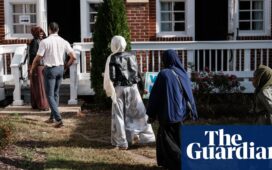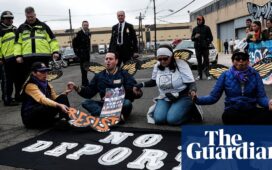In the early hours of Wednesday morning, at an airport in northern Virginia, José was finally reunited with his family.
They had been waiting five months for this moment. When José emerged through arrivals, his mother, Marta, grabbed her son tight and wouldn’t let go. She could not stop crying.
José, who is 28 but has the mental capacity of a four-year-old, had made it to Virginia after a torrid, at times terrifying, five months at the hands of Donald Trump’s brutal immigration policy.
He and his cousin had arrived in El Paso, in south-west Texas, in March, seeking asylum. José was carrying a note from his doctor, spelling out his cognitive disability. Despite that, José was separated from his cousin, who had been his carer in their home country of El Salvador, and sent back to Mexico alone. The Guardian is using first names only for José and his family for their security.

José was another victim of Trump’s Remain in Mexico program, which has turned back tens of thousands of asylum seekers at the border since it was introduced in March. Forced to return to already crowded cities, many have fallen victim to organized crime. People have been raped and killed. José himself was kidnapped and extorted.
It made the reunion at Dulles international airport, 30 miles west of Washington DC, particularly emotional.
“I was very, very happy. I couldn’t believe it. I was shaking. I felt my stomach jumping from nerves,” Marta said. She was at the airport with one of José’s sisters and one of his brothers – all four of his siblings are already in the US, having fled gang violence back home. They brought balloons, two of them yellow with smiley faces. José’s flight was delayed, and they waited there patiently for two hours.
“There were many, many tears,” Marta said of her son’s arrival. “We both got chills when we hugged.”

When they got back to Marta’s apartment José was feeling sick. Marta made him tea, rubbed his chest and eased him to sleep. The next morning he had perked up. He was ready for his favorite meal: pupusas, a Salvadoran flatbread, cooked by Marta. José ate them for breakfast. A lot of them.
The Guardian visited José, Marta and the rest of the family in a Virginia suburb on the day of his return. José’s sisters couldn’t stop hugging him. Marta was still in tears of relief. She moved to the US before José, and provided for him by sending money to El Salvador. His siblings had followed but, concerned about José’s condition, Marta made the difficult decision to leave him at home, where he was cared for by his grandmother, then his cousin.
After José arrived in El Paso and was sent back to Mexico, he lost touch with his family. He had no money, no phone and no real understanding of where he was, and was eventually taken in by the Buen Pastor shelter, in a rundown area of Juárez, Mexico.
José had been living at the shelter for weeks before he came to the attention of immigration advocates working at the border. The Guardian first met José at Buen Pastor in July, when his lawyers were in the process of arguing he should not be forced to stay in Mexico alone.

Department of Homeland Security regulations, José’s lawyers argue, say people with mental disabilities, and people from populations deemed at risk, such as those from the LGBTQ community or people with physical disabilities, should not be subject to the Remain in Mexico program.
But José, like dozens of others in Juárez alone, had fallen through the cracks.
“The so-called Migrant Protection Protocols offer no protection, and only ad hoc protocol as to how to handle migrants forced to remain in Mexico,” said Edith Tapia, an immigration advocate at the social justice not-for-profit Hope Border Institute, who accompanied José to Virginia.
“José’s case is emblematic of how the Department of Homeland Security has repeatedly and explicitly broken their own rules of exemptions and returned the most vulnerable populations to the delicate ecosystem of Juárez,” Tapia added.
José had appeared in El Paso immigration court in July, fresh with the results of a new psychiatric exam. This one, like the one from his doctor in El Salvador, found he had the mental capacity of a four-year-old, and was also suffering from anxiety and depression.
Government lawyers still argued against José being allowed to enter the US, and he was detained in Ice custody for weeks while Tapia and José’s lawyer, Marysol Bretado, battled on ’s his behalf, fighting against the monolithic and labyrinthine asylum regulations.
On Monday, José, his family, and his supporters finally got their wish. He was abruptly released on humanitarian parole. He could finally join his family. The next day, aided by the charity Miles4Migrants, he flew to Virginia with Tapia.
At Marta’s small apartment, where a bedroom had been waiting for José for months, he was tucking into more pupusas by Wednesday afternoon. They were as good as he remembered, he said.

“I’m so happy to have him here,” Marta said. She had been unable to sleep for months over concern for her son, but on Wednesday morning, Marta was sleeping so soundly she slept through her alarm.
“This was the first night I didn’t have to worry about him,” she said.
José’s parole lasts until February 2020, by which point it will be 11 months since he first arrived in the US. He has to check in with US Citizenship and Immigration Services officials over the next few months, while his attorney in El Paso appeals to have his asylum case switched to the Virginia court system.
But the long-term future for José remains uncertain.
His family hope he is granted asylum, but it is a difficult, exhausting process. José himself would like to work, and says he wants to look after his mother. On Tuesday, a day after being released from custody, and hours before his flight to Dulles, he earned $20 cleaning a yard in El Paso. He gave the money to Marta at the airport.
For now, the family is just pleased to have José back. He turned 28 on Friday, and they are planning to celebrate both his birthday and his arrival. There will be a piñata, balloons, cakes and lots of pupusas.
“We’re going to party like never before,” Marta said.
“Our family is complete now.”








